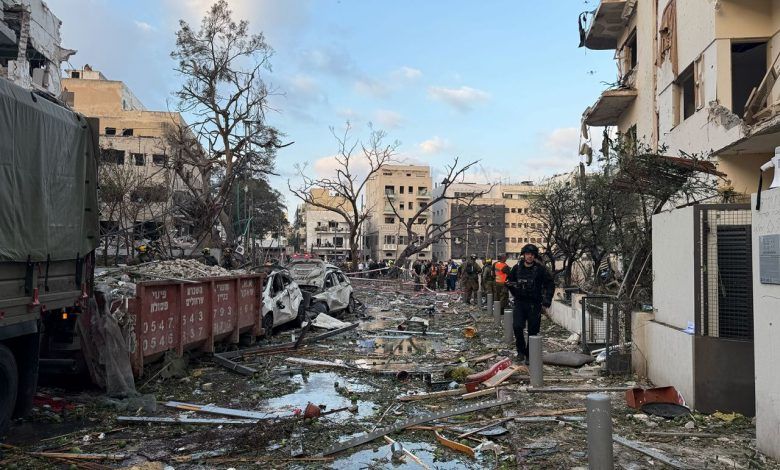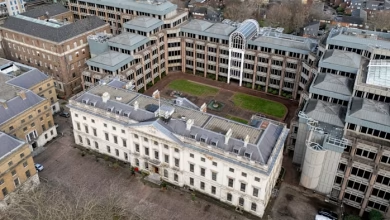Iran Strikes Tel Aviv Following Israeli Air Raids on Tehran, Escalating Regional Conflict

In a dramatic escalation of hostilities, Iran launched a barrage of missile strikes targeting Israeli cities early Monday, hours after Israeli forces conducted air raids deep inside Iran.
Both nations have warned of more devastating attacks to come, raising fears of a broader and prolonged conflict in the Middle East.
Images from AFP revealed the aftermath in Tel Aviv—residential buildings gutted by missile impacts and fires smouldering near the northern coastal city of Haifa. Residents were urged by the Israeli military to seek immediate shelter as air defense systems lit up the night sky to intercept incoming Iranian rockets. Loud explosions were also reported in Jerusalem, intensifying the sense of crisis.
The surprise Israeli strikes last week marked the most intense direct confrontation between the two long-time adversaries, who have mainly fought proxy wars and covert operations for decades. Israeli military sources say the raids targeted Iranian military and nuclear facilities, killing key commanders and scientists.
However, a senior US official disclosed Sunday that President Donald Trump had instructed Israel to abort plans to assassinate Iran’s Supreme Leader, Ayatollah Ali Khamenei, to avoid further destabilization.
Trump has called on both sides to “make a deal” but acknowledged that “sometimes they have to fight it out” first.
Monday’s Iranian missile strikes followed Israeli attacks on surface-to-surface missile sites in central Iran, according to the Israeli military. Iran’s Revolutionary Guards, through the official IRNA news agency, claimed their missile barrages “successfully” struck Israeli territory and vowed “more effective, targeted and devastating operations” ahead.
The violence has taken a heavy toll on civilians. Israel’s emergency service, Magen David Adom, reported five fatalities and 92 injuries from the latest Iranian missile attack.
Israeli Prime Minister Benjamin Netanyahu condemned Iran for deliberately targeting civilians, visiting the damaged residential area in Bat Yam near Tel Aviv and warning that “Iran will pay a very heavy price for the premeditated murder of civilians, women and children.”
Iranian strikes since Friday have killed more than a dozen Israelis. Meanwhile, Iran’s health ministry reported at least 224 dead and over 1,200 wounded due to Israeli air raids, including at least five fatalities in a residential building struck in central Tehran on Sunday.
Colonel Reza Sayyad, spokesperson for Iran’s armed forces, warned of a “devastating response” to Israel’s attacks, declaring in a televised statement that “the occupied territories will no longer be habitable,” adding that shelters will “offer no guarantee of safety.”
Iranian President Masoud Pezeshkian, addressing parliament Monday, called for national unity in the face of what he described as “genocidal criminal aggression.”
In response, Israeli Defence Minister Israel Katz cautioned that Iranian civilians will “pay the price” for the regime’s attacks on Israeli citizens.
Despite the escalating conflict and reports of residents fleeing Tehran, many Iranians expressed determination to stay. “War has its stresses, but I will not leave my city,” said 31-year-old Shokouh Razzazi.
US President Trump distanced Washington from the Israeli bombing campaign but warned that the US military would unleash “full strength and might” if Iran targeted American interests. Trump’s call for a negotiated solution came with a stark warning that “sometimes they have to fight it out.”
A senior US official, speaking anonymously, revealed that Trump had ordered Israel not to proceed with an assassination attempt on Khamenei, highlighting the delicate diplomatic balancing act in the crisis.
Iranian top diplomat Abbas Araghchi accused US forces of supporting Israel’s attacks and insisted Iran’s missile strikes were retaliatory. “If the aggression stops, our responses will also cease,” he told a gathering of foreign diplomats.
In a further blow to diplomacy, Iran canceled planned nuclear talks with the United States, calling negotiations “meaningless” amid ongoing attacks.
Separately, Iran’s judiciary announced the execution of a convicted Mossad agent, intensifying the shadow war between the two countries. Israel confirmed it had detained two suspects linked to Iranian intelligence.
As tensions soar, the prospect of peace remains uncertain, with both nations poised for further escalation that could reshape the fragile stability of the Middle East.





